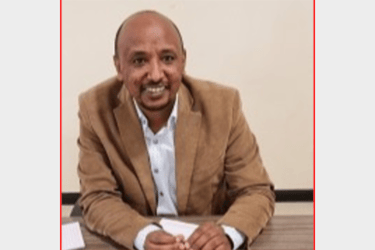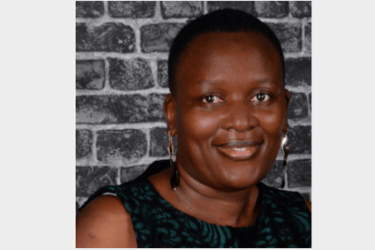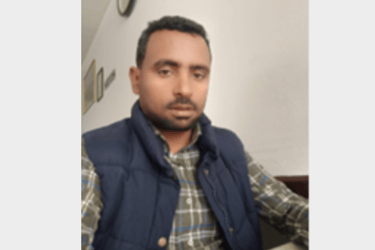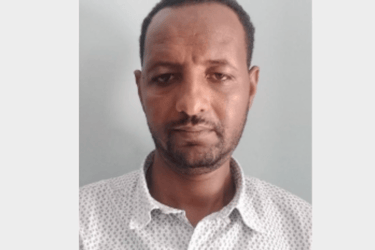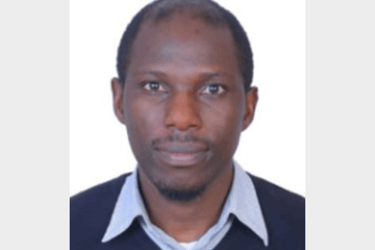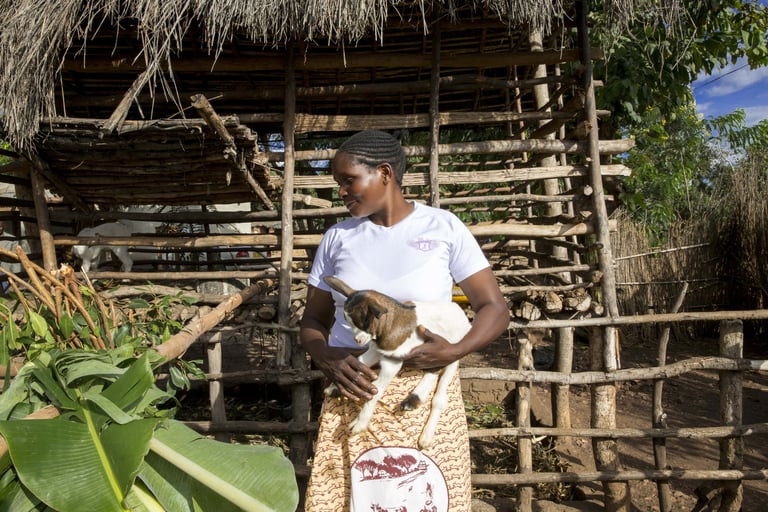ARCS at Africa Climate Summit 2
Side-Event: Locally Led, Forecast-Informed Climate Services for Resilient Smallholder Futures – ARCS in Action
Climate change is an existential threat to Africa's food systems, with smallholder farmers and pastoralists facing frequent and severe climate shocks. The Second Africa Climate Summit (ACS2) in Addis Ababa with the theme Accelerating Global Climate Solutions and Financing for Africa's Resilient and Green Development, is a vital platform to move beyond fragmented, short-term interventions towards sustainable, systemic solutions.
One of the most pressing challenges is the gap between sophisticated, accurate, and reliable forecasts and their practical use at the local level. Climate information services (CIS) and early warning systems (EWS) often fall short due to inaccurate forecasting, limited local relevance, insufficient technical capacity, and weak last-mile delivery mechanisms, that hinder meaningful action for the most vulnerable communities.
The Agricultural Resilience through Climate Services (ARCS) consortium project, led by NORCAP and consortium members – Chr. Michelsen Institute (CMI) Development Fund (DF) and Norwegian Research Centre (NORCE) in Malawi and Ethiopia, offers a proven model for building resilient food systems. ARCS addresses all components of the climate services value chain, from innovative forecasting products to localisation advisories, through a unique consortium approach that brings together national meteorological services (Department of Climate Change and Meteorological Services (DCCMS) in Malawi and Ethiopia Meteorology Institute (EMI) in Ethiopia), Ministries of Agriculture in both countries, national and international NGOs, research institutions, and farmers.
The side event will showcase the ARCS model and will deliver a concrete, African-led example of a scalable solution aligned with the core priorities of African Climate Summit 2.
We aim to:
Present lessons from Malawi and Ethiopia on how the ARCS approach can strengthen institutions and empower smallholder farmers.
Showcase high-tech solutions like AI-enhanced forecasts and ECMWF data to bridge infrastructure gaps and turn complex forecasts into actionable, user-friendly advisories.
Drive policy change and financing by generating evidence-based recommendations for the ACS2 Declaration, emphasising sustainable investment in national CIS and EWS as key to climate adaptation.
Foster meaningful partnerships through dialogue among policymakers, development actors, researchers, and the private sector to scale the ARCS model and build new collaborations.
Showcase Africa’s in Climate resilience efforts, affirming the continent's role in adaptation innovation.
About the Event
The event is a dynamic 90-minute panel discussion, followed by an interactive Q&A session. The discussion will be structured around three key pillars of the ARCS model and ACS2 goals.
Pillar 1: The Foundation & Institutional capacity.
Pillar 2: Research/evidence-based, new products/innovation, addressing gaps in evidence & bridging the gap with technology and capacity.
Pillar 3: The Impact of translating forecasts to action.
Panellists:
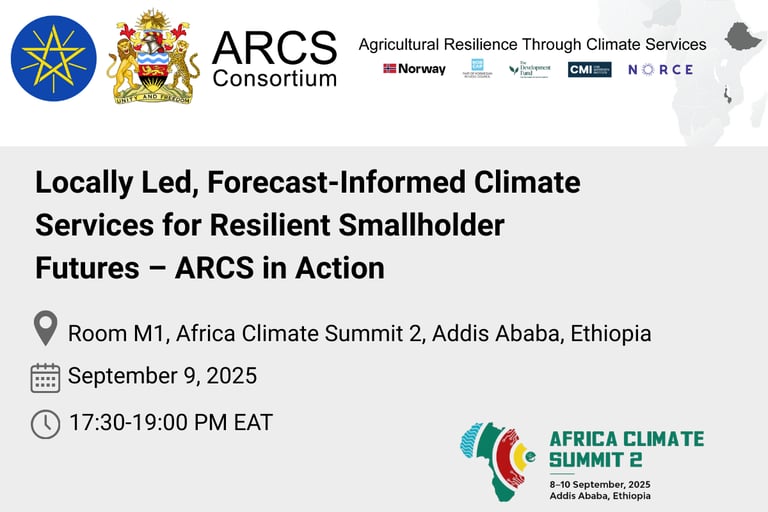

Odd Eirik Arnesen, Norway's Special Envoy for Food Security
Odd Eirik Arnesen is the Minister Counsellor, Regional Food Security Envoy for Africa, Norwegian Ministry of Foreign Affairs, based in Dar es Salaam. As a Development Geographer, he has been working extensively in Africa and Asia as a researcher and development practitioner since 1984.
Esayas Lemma Hayi, Director, Crop Development Directorate, Ministry of Agriculture, Ethiopia
Esayas Lemma Hayi holds more than 10 years of experience as an agronomist and extension worker in the public and private sector, working with farmers, experts, and stakeholders to enhance food security, sustainability, and resilience. His mission is to leverage his skills and knowledge in data analysis, crop development, cropping system, soil management, mitigation strategies, and crop modelling to develop and support innovative and evidence-based solutions for the agricultural sector.
Dr. Lucy Mtilatila, Director of the Department of Climate Change and Meteorological Services (DCCMS), Malawi
Dr. Lucy Mtilatila is a distinguished Climate Scientist, boasting over two decades of invaluable experience in meteorology. Her profound expertise includes a passion for modeling, with a particular focus on climate and hydrological systems. She currently serves as the Director for Climate Change and Meteorological Services in Malawi.
Philip Tegha, Country Director Development Fund Malawi
Philip Tegha holds over 23 years of experience working with rural communities on agricultural, climate, social and economic related projects through international NGOs. He holds a MSc in Gender and Development Studies from Lilongwe University of Agriculture and Natural Resources (LUANAR), as well as degrees in Agriculture and Development Studies, and currently serves as the Country Director for Development Fund Malawi.
Dr. Gemechu Fanta Garuma
Dr. Gemechu Fanta Garuma is a highly accomplished climate modeler and impact researcher dedicated to improving weather and climate predictability, particularly in tropical East Africa. He is currently improving the seasonal to sub-seasonal prediction using numerical downscaling at the Ethiopian Meteorological Institute, holding the position as NORCAP Expert and Climate Modeler. Beyond research, he teaches Climate Modeling at Addis Ababa University and previously taught Statistical and Computational Methods, demonstrating his commitment to education and mentorship.
Dr. Mebratu Negera Feyisa
Dr Mebratu has a PhD in Economics specializing in Environmental Economics and has worked for various Ethiopian universities and research institutions. He is a postdoctoral researcher in ARCS at Econinsight Center for Development Research, Partnering with Chr. Michelsen Institute (CMI). His research and publications focus on food security, energy saving, climate smart technologies, climate resilience and vulnerability, financial inclusion, solar pump irrigation, willingness to pay for community-based health insurance, energy choice and consumption, economic growth and capital inflows.
Renata Jagustovic, Consortium Manager of Agricultural Resilience through Climate Services (ARCS)
Renata Jagustovic is a programme leader with over 15 years of expertise in designing and managing complex climate adaptation and resilience initiatives across Africa. As the Consortium Manager for ARCS, she oversees a multi-million-dollar portfolio funded by Norad to implement climate-resilient food systems through climate information services. As a NORCAP representative at the Africa Climate Summit, she provides extensive expertise in fostering multi-stakeholder partnerships among governments, UN agencies, and research institutions to strengthen climate services and early warning systems.
Moderators:
Joseph Kirule, Project Coordinator Climate Resilience and Natural Resource Management
Renata Jagustovic is a programme leader with over 15 years of expertise in designing and managing complex climate adaptation and resilience initiatives across Africa. As the Consortium Manager for ARCS, she oversees a multi-million-dollar portfolio funded by Norad to implement climate-resilient food systems through climate information services. As a NORCAP representative at the Africa Climate Summit, she provides extensive expertise in fostering multi-stakeholder partnerships among governments, UN agencies, and research institutions to strengthen climate services and early warning systems.


